Exam 13: Simple Linear Regression
Exam 1: Introduction and Data Collection137 Questions
Exam 2: Presenting Data in Tables and Charts181 Questions
Exam 3: Numerical Descriptive Measures138 Questions
Exam 4: Basic Probability152 Questions
Exam 5: Some Important Discrete Probability Distributions174 Questions
Exam 6: The Normal Distribution and Other Continuous Distributions180 Questions
Exam 7: Sampling Distributions and Sampling180 Questions
Exam 8: Confidence Interval Estimation185 Questions
Exam 9: Fundamentals of Hypothesis Testing: One-Sample Tests180 Questions
Exam 10: Two-Sample Tests184 Questions
Exam 11: Analysis of Variance179 Questions
Exam 12: Chi-Square Tests and Nonparametric Tests206 Questions
Exam 13: Simple Linear Regression196 Questions
Exam 14: Introduction to Multiple Regression258 Questions
Exam 15: Multiple Regression Model Building88 Questions
Exam 16: Time-Series Forecasting and Index Numbers193 Questions
Exam 17: Decision Making127 Questions
Exam 18: Statistical Applications in Quality Management113 Questions
Exam 19: Statistical Analysis Scenarios and Distributions82 Questions
Select questions type
TABLE 13-12
The manager of the purchasing department of a large banking organization would like to develop a model to predict the amount of time (measured in hours) it takes to process invoices. Data are collected from a sample of 30 days, and the number of invoices processed and completion time in hours is recorded. Below is the regression output:
Regression Statistics Multiple R 0.9947 R Square 0.8924 Adjusted R Square 0.8886 Standard Error 0.3342 Observations 30 ANOVA df SS MS F Significance F Regression 1 25.9438 25.9438 232.2200 4.3946-15 Residual 28 3.12820.1117 Total 29 29.072 Coefficients Standard Enror t Stat p -value Lower 95\% Upper 95\% Invoices 0.4024 0.1236 3.2559 0.0030 0.1492 0.6555 Processed 0.0126 0.0008 15.2388 4.394615 0.0109 0.0143 Coefficients Standard Enor t Stat p -value Lower 95\% Upper 95\% Invoices 0.4024 0.1236 3.2559 0.0030 0.1492 0.6555
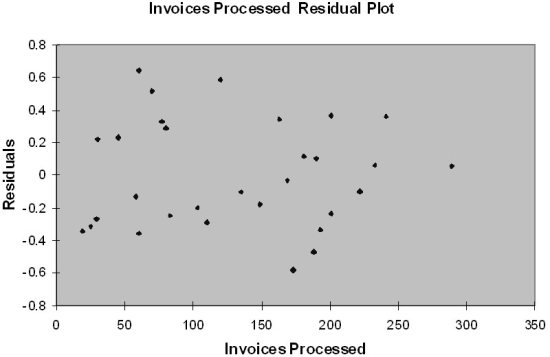
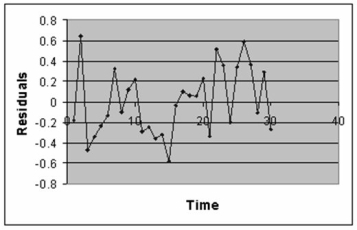 -Referring to Table 13-12, the 90% confidence interval for the average change in the amount of time needed as a result of processing one additional invoice is
-Referring to Table 13-12, the 90% confidence interval for the average change in the amount of time needed as a result of processing one additional invoice is
(Multiple Choice)
4.8/5  (34)
(34)
TABLE 13-2
A candy bar manufacturer is interested in trying to estimate how sales are influenced by the price of their product. To do this, the company randomly chooses 6 small cities and offers the candy bar at different prices. Using candy bar sales as the dependent variable, the company will conduct a simple linear regression on the data below:
City Price (\ ) Sales River Falls 1.30 100 Hudson 1.60 90 Ellsworth 1.80 90 Prescott 2.00 40 Rock Elm 2.40 38 Stillwater 2.90 32
-Referring to Table 13-2, what is the percentage of the total variation in candy bar sales explained by the regression model?
(Multiple Choice)
4.9/5  (37)
(37)
TABLE 13-4
The managers of a brokerage firm are interested in finding out if the number of new clients a broker brings intothe firm affects the sales generated by the broker. Theysample 12 brokersand determine the numberof new clients they have enrolled in the last year and their sales amountsin thousandsof dollars. These data are presented in the table that follows. Broker Clients Sales 1 27 52 2 11 37 3 42 64 4 33 55 5 15 29 6 15 34 7 25 58 8 36 59 9 28 44 10 30 48 11 17 31 12 22 38
-Referring to Table 13-3, the coefficient of determination is _______.
(Short Answer)
4.9/5  (48)
(48)
The coefficient of determination represents the ratio of SSR to SST.
(True/False)
4.9/5  (34)
(34)
TABLE 13-4
The managers of a brokerage firm are interested in finding out if the number of new clients a broker brings into the firm affects the sales generated by the broker. They sample 12 brokers and determine the number of new clients they have enrolled in the last year and their sales amounts in thousands of dollars. These data are presented in the table that follows.
Broker Clients Sales 1 27 52 2 11 37 3 42 64 4 33 55 5 15 29 6 15 34 7 25 58 8 36 59 9 28 44 10 30 48 11 17 31 12 22 38
-Referring to Table 13-4, the managers of the brokerage firm wanted to test the hypothesis that the number of new clients brought in had a positive impact on the amount of sales generated. At a level of significance of 0.01, the null hypothesis should be________ (accepted or rejected).
(Short Answer)
4.9/5  (39)
(39)
TABLE 13-4
The managers of a brokerage firm are interested in finding out if the number of new clients a broker brings into the firm affects the sales generated by the broker. They sample 12 brokers and determine the number of new clients they have enrolled in the last year and their sales amounts in thousands of dollars. These data are presented in the table that follows.
Broker Clients Sales 1 27 52 2 11 37 3 42 64 4 33 55 5 15 29 6 15 34 7 25 58 8 36 59 9 28 44 10 30 48 11 17 31 12 22 38
-Referring to Table 13-4, the standard error of estimate is ______.
(Short Answer)
4.7/5  (26)
(26)
TABLE 13-2
A candy bar manufacturer is interested in trying to estimate how sales are influenced by the price of their product. To do this, the company randomly chooses 6 small cities and offers the candy bar at different prices. Using candy bar sales as the dependent variable, the company will conduct a simple linear regression on the data below:
City Price (\ ) Sales River Falls 1.30 100 Hudson 1.60 90 Ellsworth 1.80 90 Prescott 2.00 40 Rock Elm 2.40 38 Stillwater 2.90 32
-Referring to Table 13-2, what is the estimated slope parameter for the candy bar price and sales data?
(Multiple Choice)
4.9/5  (37)
(37)
The sample correlation coefficient between X and Y is 0.375. It has been found out that the p- value is 0.256 when testing H0 : q = 0 against the one- sided alternative H0 : q > 0. To test H0 : q = 0 against the two- sided alternative H0 : q × 0 at a significance level of 0.2, the p- value is
(Multiple Choice)
4.8/5  (34)
(34)
TABLE 13-10
The management of a chain electronic store would like to develop a model for predicting the weekly sales (in thousand of dollars) for individual stores based on the number of customers who made purchases. A random sample of 12 stores yields the following results:
Customers Sales (Thousands of Dollars) 907 11.20 926 11.05 713 8.21 741 9.21 780 9.42 898 10.08 510 6.73 529 7.02 460 6.12 872 9.52 650 7.53 603 7.25
-Referring to Table 13-10, the value of the F test statistic equals the square of the t test statistic when testing whether the number of customers who make purchases is a good predictor for weekly sales.
(True/False)
4.7/5  (39)
(39)
TABLE 13- 11
A company that has the distribution rights to home video sales of previously released movies would like to use the box office gross (in millions of dollars) to estimate the number of units (in thousands of units) that it can expect to sell. Following is the output from a simple linear regression along with the residual plot and normal probability plot obtained from a data set of 30 different movie titles:
Regression Statistics Multiple R 0.8531 RSquare 0.7278 Adjusted R Square 0.7180 Standard Error 47.8668 Observations 30
ANOVA
d f SS MS F Significance F Regression 1 171499.78 171499.78 74.8505 2.1259E-09 Residual 28 64154.42 2291.23 Total 29 235654.20
Coefficients Standard Error t Stat p -value Lower 95\% Upper 95\% Intercept 76.5351 11.8318 6.4686 5.24-07 52.2987 100.7716 Gross 4.3331 0.5008 8.6516 2.13-09 3.3072 5.3590
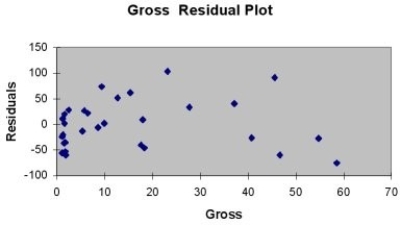
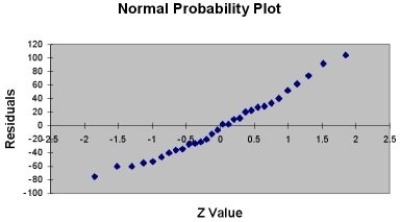 -Referring to Table 13-11, the null hypothesis for testing whether there is a linear relationship between box office gross and home video unit sales is "There is no linear relationship between box office gross and home video unit sales."
-Referring to Table 13-11, the null hypothesis for testing whether there is a linear relationship between box office gross and home video unit sales is "There is no linear relationship between box office gross and home video unit sales."
(True/False)
4.8/5  (36)
(36)
TABLE 13-3
The director of cooperative education at a state college wants to examine the effect of cooperative education job experience on marketability in the work place. She takes a random sample of 4 students. For these 4, she finds out how many times each had a cooperative education job and how many job offers they received upon graduation. These data are presented in the table below.
Student CoopJobs JobOffer 1 1 4 2 2 6 3 1 3 4 0 1
-Referring to Table 13-3, the total sum of squares (SST) is _____.
(Short Answer)
4.8/5  (28)
(28)
TABLE 13-2
A candy bar manufacturer is interested in trying to estimate how sales are influenced by the price of their product. To do this, the company randomly chooses 6 small cities and offers the candy bar at different prices. Using candy bar sales as the dependent variable, the company will conduct a simple linear regression on the data below:
City Price (\ ) Sales River Falls 1.30 100 Hudson 1.60 90 Ellsworth 1.80 90 Prescott 2.00 40 Rock Elm 2.40 38 Stillwater 2.90 32
-Referring to Table 13-2, to test that the regression coefficient, þ1, is not equal to 0, what would be the critical values? Use ? = 0.05.
(Multiple Choice)
4.9/5  (36)
(36)
TABLE 13-3
The director of cooperative education at a state college wants to examine the effect of cooperative education job experience on marketability in the work place. She takes a random sample of 4 students. For these 4, she finds out how many times each had a cooperative education job and how many job offers they received upon graduation. These data are presented in the table below.
Student CoopJobs JobOffer 1 1 4 2 2 6 3 1 3 4 0 1
-Referring to Table 13-3, set up a scatter diagram.
(Essay)
4.8/5  (39)
(39)
TABLE 13-10
The management of a chainelectronicstore would like to develop a model for predicting the weekly sales (in thousandof dollars) for individual stores based on the number of customers whomade purchases. A random sample of 12 stores yields the followingresults: Customers Sales (Thousands of Dollars) 907 11.20 926 11.05 713 8.21 741 9.21 780 9.42 898 10.08 510 6.73 529 7.02 460 6.12 872 9.52 650 7.53 603 7.25
-Referring to Table 13-10, the null hypothesis for testing whether the number of customers who make purchase effects weekly sales cannot be rejected if 1% probability of committing a type I error is desired.
(True/False)
4.8/5  (32)
(32)
TABLE 13- 11
A company that has the distribution rights to home video sales of previously released movies would like to use the box office gross (in millions of dollars) to estimate the number of units (in thousands of units) that it can expect to sell. Following is the output from a simple linear regression along with the residual plot and normal probability plot obtained from a data set of 30 different movie titles:
Regression Statistics Multiple R 0.8531 RSquare 0.7278 Adjusted R Square 0.7180 Standard Error 47.8668 Observations 30
ANOVA
d f SS MS F Significance F Regression 1 171499.78 171499.78 74.8505 2.1259E-09 Residual 28 64154.42 2291.23 Total 29 235654.20
Coefficients Standard Error t Stat p -value Lower 95\% Upper 95\% Intercept 76.5351 11.8318 6.4686 5.24-07 52.2987 100.7716 Gross 4.3331 0.5008 8.6516 2.13-09 3.3072 5.3590

 TABLE 13-5
Regression Statistics Multiple R 0.802 R Square 0.643 Adjusted R Square 0.618 Standard Error SYX 0.9224 Observations 16
ANOVA
d f SS MS F Sig.F Regression 1 21.497 21.497 25.27 0.000 Error 14 11.912 0.851 Total 15 33.409
Predictor Coefficients Standard Error t Stat p -value Intercept 3.962 1.440 2.75 0.016 Industry 0.040451 0.008048 5.03 0.000
-Referring to Table 13-11, the null hypothesis that there is no linear relationship between box office gross and home video unit sales should be reject at a 5% level of significance.
TABLE 13-5
Regression Statistics Multiple R 0.802 R Square 0.643 Adjusted R Square 0.618 Standard Error SYX 0.9224 Observations 16
ANOVA
d f SS MS F Sig.F Regression 1 21.497 21.497 25.27 0.000 Error 14 11.912 0.851 Total 15 33.409
Predictor Coefficients Standard Error t Stat p -value Intercept 3.962 1.440 2.75 0.016 Industry 0.040451 0.008048 5.03 0.000
-Referring to Table 13-11, the null hypothesis that there is no linear relationship between box office gross and home video unit sales should be reject at a 5% level of significance.
(True/False)
4.8/5  (35)
(35)
If the residuals in a regression analysis of time ordered data are not correlated, the value of the Durbin-Watson D statistic should be near _____.
(Short Answer)
4.9/5  (30)
(30)
TABLE 13- 11
A company that has the distribution rights to home video sales of previously released movies would like to use the box office gross (in millions of dollars) to estimate the number of units (in thousands of units) that it can expect to sell. Following is the output from a simple linear regression along with the residual plot and normal probability plot obtained from a data set of 30 different movie titles:
Regression Statistics Multiple R 0.8531 RSquare 0.7278 Adjusted R Square 0.7180 Standard Error 47.8668 Observations 30
ANOVA
d f SS MS F Significance F Regression 1 171499.78 171499.78 74.8505 2.1259E-09 Residual 28 64154.42 2291.23 Total 29 235654.20
Coefficients Standard Error t Stat p -value Lower 95\% Upper 95\% Intercept 76.5351 11.8318 6.4686 5.24-07 52.2987 100.7716 Gross 4.3331 0.5008 8.6516 2.13-09 3.3072 5.3590

 -Referring to Table 13-11, what is the p-value for testing whether there is a linear relationship between box office gross and home video unit sales at a 5% level of significance?
-Referring to Table 13-11, what is the p-value for testing whether there is a linear relationship between box office gross and home video unit sales at a 5% level of significance?
(Short Answer)
4.7/5  (39)
(39)
The director of cooperative education at a state college wants to examine the effect of cooperative education job experience on marketability in the work place. She takes a random sample of 4 students. For these 4, she finds out how many times each had a cooperative education job and how many job offers they received upon graduation. These data are presented in the table below.
Student CoopJobs JobOffer 1 1 4 2 2 6 3 1 3 4 0 1
-Referring to Table 13-3, suppose the director of cooperative education wants to obtain a 95% prediction interval for the number of job offers received by a person who has had exactly two cooperative education jobs. The prediction interval is from _____to______
(Short Answer)
4.9/5  (42)
(42)
TABLE 13-12
The manager of the purchasing department of a large banking organization would like to develop a model to predict the amount of time (measured in hours) it takes to process invoices. Data are collected from a sample of 30 days, and the number of invoices processed and completion time in hours is recorded. Below is the regression output:
Regression Statistics Multiple R 0.9947 R Square 0.8924 Adjusted R Square 0.8886 Standard Error 0.3342 ations 30
d f SS MS F Significance F Regression 1 25.9438 25.9438 232.2200 4.3946-15 Residual 28 3.1282 0.1117 Total 29 29.072
Coefficients Standard Error t Stat p -value Lower 95\% Upper 95\% Invoices 0.4024 0.1236 3.2559 0.0030 0.1492 0.6555 Processed 0.0126 0.0008 15.2388 4.3946-15 0.0109 0.0143
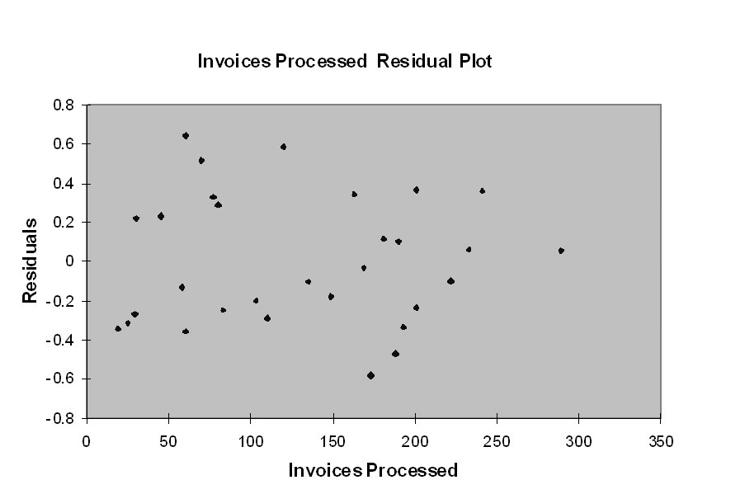
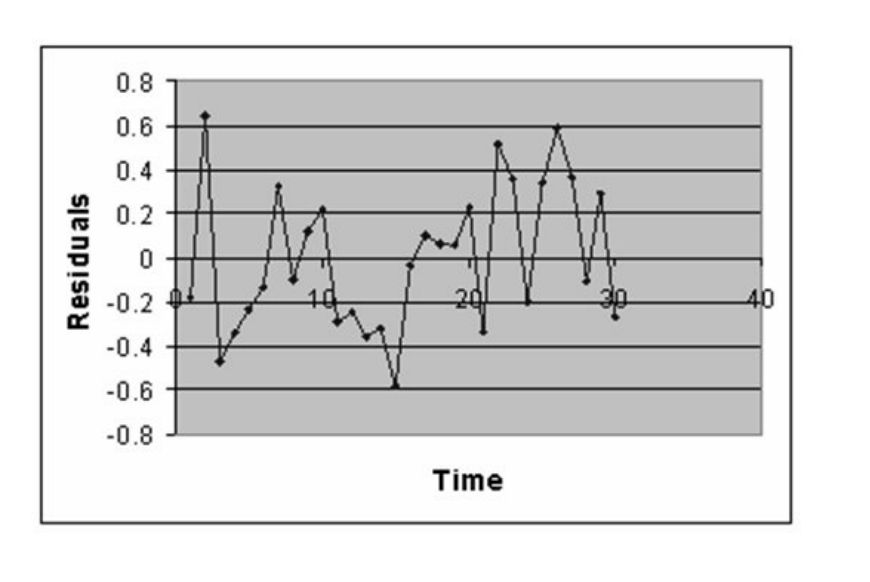 -Referring to Table 13-12, the value of the measured t-test statistic to test whether the amount of time depends linearly on the number of invoices processed is
-Referring to Table 13-12, the value of the measured t-test statistic to test whether the amount of time depends linearly on the number of invoices processed is
(Multiple Choice)
4.9/5  (35)
(35)
TABLE 13-4
The managers of a brokerage firm are interested in finding out if the number of new clients a broker brings into the firm affects the sales generated by the broker. They sample 12 brokers and determine the number of new clients they have enrolled in the last year and their sales amounts in thousands of dollars. These data are presented in the table that follows.
Broker Cliente Sales 1 27 52 2 11 37 3 42 64 4 33 55 5 15 29 6 15 34 7 25 58 8 36 59 9 28 44 10 30 48 11 17 31 12 22 38
-Referring to Table 13-4, the total sum of squares (SST) is _______.
(Short Answer)
4.9/5  (38)
(38)
Showing 141 - 160 of 196
Filters
- Essay(0)
- Multiple Choice(0)
- Short Answer(0)
- True False(0)
- Matching(0)